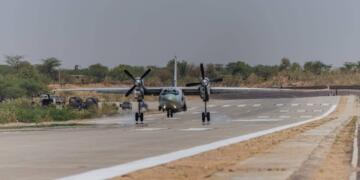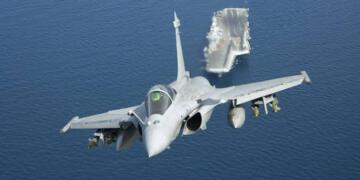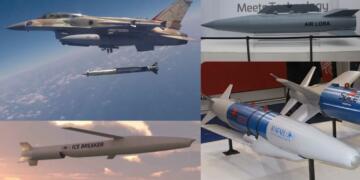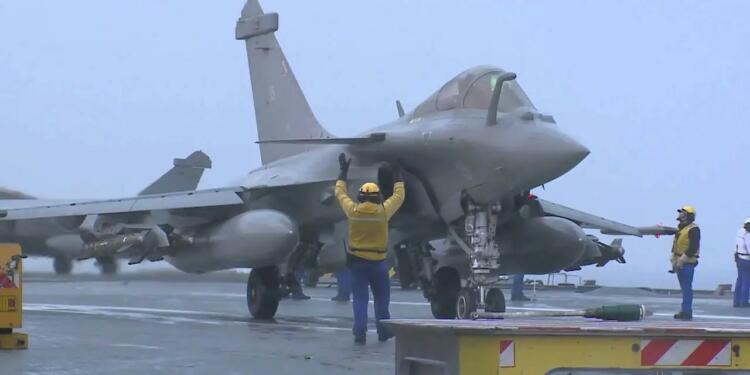Replacement of MIG-29K: India’s Navy had accomplished a remarkable feat with the construction of INS Vikrant, a domestically built aircraft carrier. This achievement has given India a significant advantage in the Indian Ocean and will help counter any potential Chinese aggression in the region. In addition, the carrier will play a crucial role in safeguarding India’s Exclusive Economic Zones (EEZ).
With China’s substantial investments in countries such as Sri Lanka and the Maldives, there are growing concerns that it is adopting an increasingly aggressive stance.
However, for an aircraft carrier to be effective, it requires aircraft. Therefore, the Indian government is determined to seal the deal for the naval aircraft fleet for INS Vikrant.
CCS is likely to give the green light
On September 2, 2022, Prime Minister Narendra Modi commissioned INS Vikrant, India’s first indigenous aircraft carrier, to the Indian Navy. This marked the beginning of a new chapter for the Indian Naval Force. Soon, the Indian Navy clarified that it is looking to procure 26 aircraft for a naval fleet aboard the INS Vikrant. Various contenders across the world showed their interest in winning the contract. But to fulfil the required features, only two contenders were chosen. This started a competition between the Dassault Rafale and the US Boeing F-18 Super Hornet. And now it looks like the Navy has decided to proclaim Rafale victorious.
The Cabinet Committee on Security (CCS) led by Prime Minister Narendra Modi is expected to approve the purchase of 26 marine versions of Rafale fighter aircraft in a multi-billion dollar acquisition. Sources suggest that the Indian Navy has expressed a preference for the French fighter over the US F-18 Super Hornet. The purchase of the Rafale Marine has been proposed to the CCS, following the acquisition of 36 Rafale fighters by the Indian Air Force.
The common features of the two versions of the aircraft have reportedly influenced the Navy’s decision, as it will result in savings on training, repairs, and maintenance. The Rafale Marines will be deployed on the INS Vikrant and will come equipped with maritime systems capable of detecting submarines and warships.
Pro-India contract terms
The comprehensive contract negotiated by the Ministry of Defence includes a performance-based logistics agreement, which means that responsibility for maintenance and supply of spares will be with the original equipment manufacturer, Dassault. As part of the deal, Dassault will also build a maintenance facility for the Rafales on INS Vikrant and another one in Goa. The company will also provide training to naval aviation ground crew and pilots.
The decision to opt for an inter-governmental agreement instead of an open tender was taken by the Cabinet Committee on Security, which comprises the ministers for defence, home, finance, and external affairs, along with the national security advisor and the Prime Minister of India. This committee is responsible for making decisions regarding national security.
Although the price of the Rafale Marines has not been disclosed, sources suggest that it will be considerably lower than the Indian Air Force version. The acquisition of the Rafale Marines is expected to enhance the operational readiness of the Indian Navy and provide the necessary air cover to its carrier battle groups. The acquisition is also expected to strengthen the strategic partnership between India and France, which share a common vision of a rules-based international order and cooperation in the maritime domain.
Also Read: Dominating the skies: The unstoppable Atmanirbhar Helicopter Revolution
Time to replace the MIG-29K
The Indian Navy has been grappling with the issue of replacing its ageing fleet of MiG-29K fighter jets, which were procured from Russia in the early 2000s. These MiG-29K jets have been plagued with issues, and their reliability has been a cause for concern. As a result, the Indian Navy has been exploring various options to replace these MiG-29K jets with more modern and capable fighters.
One of the options that the Navy has been considering is the development of its own twin-engine deck-based fighters, which would be designed and built indigenously in India. This long-term solution would not only meet the Navy’s requirement for carrier-based fighters but also boost the country’s aerospace industry.
However, developing a new fighter from scratch is a time-consuming and expensive process, and it could take several years before the aircraft is ready for deployment. In the meantime, the Navy needs to maintain its operational readiness and ensure that its carrier battle groups have the necessary air cover. As a result, the Navy has decided to acquire the Rafale Marines, a variant of the Rafale fighter jet that is specifically designed for carrier operations.
After the Rafale-M is acquired, INS Vikrant will start to work with full efficiency with its own dedicated aircraft fleet. The Indian Navy’s acquisition of 26 Rafale fighters marks a significant development in India’s efforts to maintain a strong naval presence in the Indian Ocean region and counter potential threats. Overall, the addition of these advanced fighter jets to the Indian Navy’s arsenal is sure to bolster India’s strategic position in the region.
Support TFI:
Support us to strengthen the ‘Right’ ideology of cultural nationalism by purchasing the best quality garments from TFI-STORE.COM




























